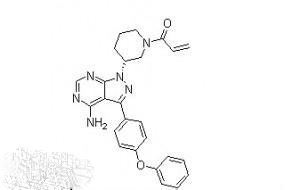- 产品详情
Alias: CRA-032765, PCI-32765
Chemical name: 1-[(3R)-3-[4-amino-3-(4-phenoxyphenyl)-1H-pyrazolo[3,4-d]pyrimidin-1-yl]-1- Piperidinyl]-2-propen-1-one
CAS No: 936563-96-1
Molecular formula: C25H24N6O2
Relative molecular mass: 440.50
This product is white or off-white solid, soluble in dimethyl sulfoxide, soluble in methanol, insoluble in water; partition coefficient ( lgP) is 3.97 (pH = 7); dissociation constant (pKa) is 74; It is 149 ~ 158 °C.
Mechanism
The B cell antigen receptor (BCR) signaling pathway is a key driver of many tumor growth and dissemination. As an indispensable participant in the BCR signal peptide, BTK is essential for the formation, differentiation, information transmission and survival of B lymphocytes. BTK is a signal peptide molecule recognized by the BCR channel. When the signal peptide molecule crosses the B lymphocyte surface receptor, the essential channel for B lymphocyte transport, chemotaxis and adhesion is activated. This is a B cell malignant tumor. The formation of the convenience provided.
Ibrutinib is a small molecule BTK inhibitor that selectively binds covalently to a cysteine residue ( Cys-481) at the active site of BTK, irreversibly inhibits BTK activity and thereby inhibits BCR Activation of the signaling pathway effectively prevents tumors from migrating from B cells to lymphoid tissues suitable for tumor growth, reducing the malignant proliferation of B cells and inducing apoptosis, thereby exerting a therapeutic effect on CLL and MCL. Non-clinical studies have shown that ibrutinib can inhibit the proliferation and survival of malignant B lymphocytes in vivo.
Uses: Treatment of chronic lymphocytic leukemia, mantle cell lymphoma.
版权所有(C)湖南惠瑞药业有限公司
